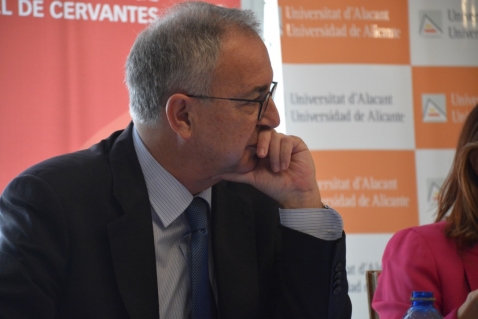Interview with Manuel Bravo, director of Miguel de Cervantes Virtual Library Foundation
Fecha: 20-06-2018
Nombre: Manuel Bravo
Sector: Culture and leisure
Organismo, Institución o Empresa: Fundación Biblioteca Virtual Miguel de Cervantes
País: Spain

The Miguel de Cervantes Virtual Library, winner of the 1st edition of Aporta Awards, facilitates access and reuse of its funds, based on international standards, with the focus on user experience and the dissemination of Hispanic culture. Manuel Bravo, General Director of the Foundation, tells us how this initiative was born and how it has evolved over the years, and share his opinion on the reuse of open data in Spain.
The Miguel de Cervantes Virtual Library was created in 1998 with the aim of facilitating access to culture for all citizens. What did such an innovative initiative represent at that time? How would you rate its impact?
At the time of its inauguration, Cervantes had few similar precedents. It was welcomed highlighting its vocation to spread the Hispanic culture in the world, completely free of charge. And the use of a tool such as the Internet was particularly underlined in order to reach disadvantaged populations whose access to culture and education was frankly difficult.
What barriers have you found to open cultural information and how have you solved it?
In general, institutions tend to be reluctant to publish open information. In particular, the origin of our library is the dissemination of the culture in Spanish through classical literature whose copyright have expired; in some cases they have been assigned for dissemination, a fact that facilitates their publication. However, with the development of the Internet, it is evident that entities that do not assume data opening could be relegated to a second place, regarding the Internet. Search engines are a great source of visits and visibility - for many, it is the main one-, and databases such as Wikidata are a reference for positioning algorithms.
Could you briefly tell us about the catalogue that you currently offer to those citizens who want to access your portal? Currently, in what phase are you in the process of opening the information that you keep?
Our catalogue consists of some 230,000 records, of which 60,000 are books, but we also offer critical and research studies, historical materials, newspapers and magazines, audiovisual documents, sound files, videos in Spanish sign language, etc. It is mainly old works that are in the public domain, but also works of contemporary authors.
Currently, our open data platform offers the complete catalogue. Periodically, it is synchronized with the traditional version, updating the bibliographic records and the authors’ information. In addition, several access points have been created, such as the possibility of surfing through cities using natural language processing techniques.
In addition to its extensive catalogue, one of the Miguel de Cervantes Virtual Library main values is the focus on the user, what differentiates your portal user experience from other similar ones?
From the beginning, our library has a Librarian service so that users can send us their comments and suggestions, as well as desiderata and even their own contents to include in the catalogue, contents that are appreciated by a committee of publications and many of which have gone to swell, effectively, our fund.
In addition to this service, we currently have profiles on Twitter and Facebook (this one has more than 400,000 followers) so that the connection with the user is greater and we can even include them in our activities, competitions, etc.
You also offer the possibility of reusing the published data, what is the reuse potential of cultural open data?
Currently, the most representative example of reuse of our catalogue can be found in large collaborative databases, such as Wikidata. We are lucky to be one of the first libraries to have been connected (harvested in computer jargon) to Wikidata. This fact allows consulting our catalog through Wikidata, opening a new range of possibilities, new users, new collaborations...
On the other hand, it has also helped us to establish relations with Wikimedia Foundation, which has a similar objective to our project, in terms of culture dissemination and promotion. We would love to contribute in the future to the creation of information in a collaborative way and to be a reference in Spain and Latin America.
What would be needed for sociaty to appreciate even more the role of public data?
Open data has become a key resource for social innovation and economic growth with enormous commercial value.
Providing free access to data opens a new scenario where citizens have the opportunity to evaluate and reuse information, whether from state sources or private entities. Both traditional businesses and new entrepreneurs are using open data to explore new market opportunities, and also build new products based on data.
Despite the effort made by many municipalities and institutions publishing their open data, there is still a long way to go. Among other issues, we must improve aspects such as publication formats, data description or enrichment with other repositories to facilitate the analysis and reuse of information. We are working on this aspect, but for now, we have prototypes and preliminary works that are difficult to generalize to all contexts.
Do you think initiatives such as the 2017 Aporta Awards can help boost the reuse of open data? What other initiatives of this kind do you think should be put into practice?
Undoubtedly, the Aporta Awards are a perfect showcase to promote the reuse of open data. Thanks to this type of initiatives, companies have the opportunity to put their projects on the map and expand their visibility, nationally and internationally.
Universities have a great opportunity to promote reuse through entrepreneur events, carrying out final degree and master projects, research projects... A few years ago it was not possible to have a data bank to develop projects. Today this aspect has improved substantially.











